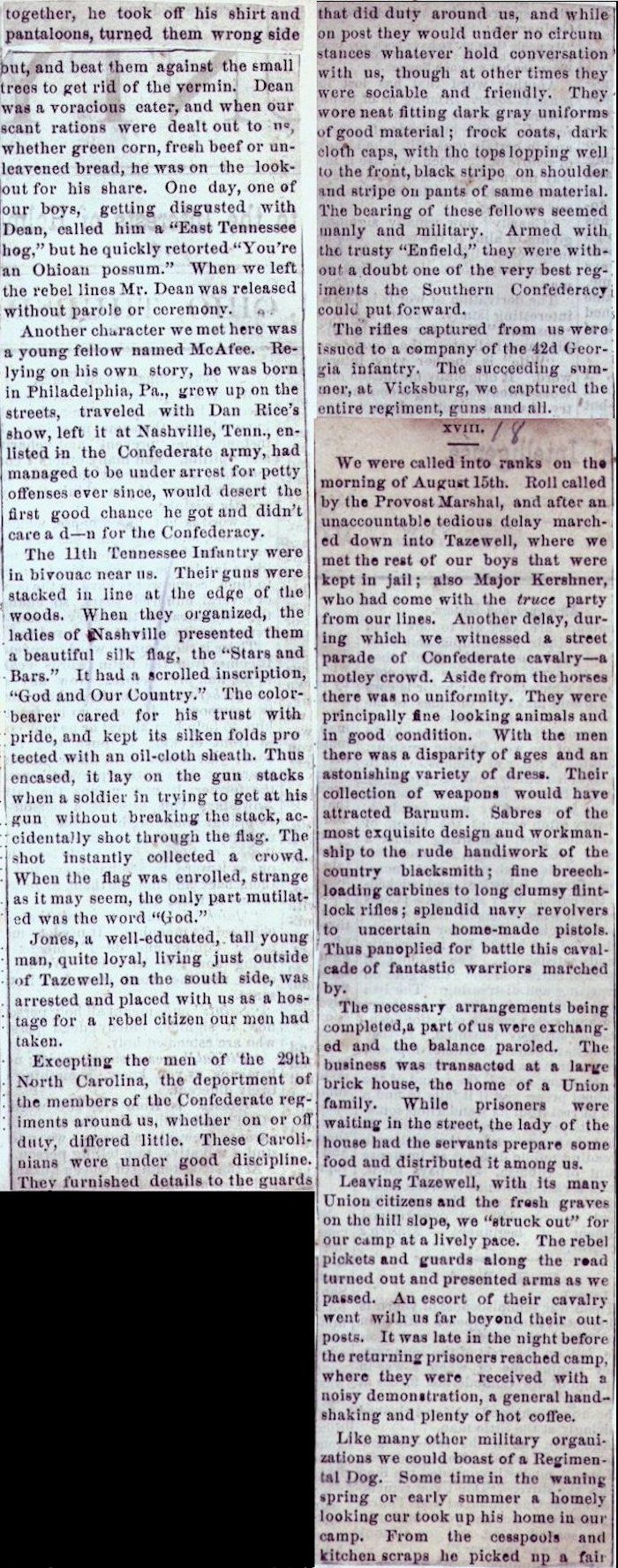| Camp & Field Page 29 | Camp & Field Index Page | 16th OVI Home Page | Camp & Field Page 31 |
The Camp & FieldArticles by Theodore Wolbach |
 Cpl. Theodore D. Wolbach |
The following image is taken from a book titled "Mortality and Statistics of the Census of 1850" in which it is believed retired Captain Rezin H. Vorhes, Company H, pasted over the pages a series of articles written by Cpl. Theodore D. Wolbach, Company E, titled "Camp and Field" and published, by chapter, in the Holmes County (Ohio) Republican newspaper from February 24, 1881 to August 17, 1882. The articles tell the story, in great detail and color, of the 16th OVI, from the inception of the 3-year regiment in October, 1861, through all its camps, battles and marches until it was disbanded on October 31, 1864. The articles pasted in the Vorhes book cover the first 35 chapters, published through October 20, 1881. All the remaining chapters were recently found in a Holmes County library by researcher Rob Garber who obtained copies, performed the transcriptions and provided to this website and which are also presented here, thus providing the complete work by Theodore Wolbach.
Throughout these articles click on the underlined white text for additional details.
The webauthor thanks 16th Ohio descendant Rob Garber for his excellent research on the Camp And Field articles and for performing the tedious digital transcription of those articles found on each page. The transcriptions were made to reflect the original articles verbatim, misspellings and all. Rob is the 3rd great nephew of Capt. William Buchanan, Company F, 16th Ohio, who served in the 90-day regiment as a private, re-enlisting in the three year regiment, and eventually making the rank of Captain of Company F. Thanks Rob!
Page 30 - Chapter 17, 18 - August, 1862
 |
together, he took off his shirt and pantaloons, turned them wrong side out, and beat them against the small trees to get rid of the vermin. Dean was a voracious eater, and when our scant rations were dealt out to us, whether green corn, fresh beef or unleavened bread, he was on the lookout for his share. One day, one of our boys, getting disgusted with Dean, called him a Another character we met here was a young fellow named McAfee. Relying on his own story, he was born in Philadelphia, Pa., grew up on the streets, traveled with Dan Rice's show, left it at Nashville, Tenn., enlisted in the Confederate army, had managed to be under arrest for petty offenses ever since, would desert the first good chance he got and didn't care a d--n for the Confederacy. The 11th Tennessee Infantry were in bivouac near us. Their guns were stacked in line at the edge of the woods. When they organized, the ladies of Nashville presented them a beautiful silk flag, the Jones a well-educated, tall young man, quite loyal, living just outside of Tazewell, on the south side, was arrested and placed with us as a hostage for a rebel citizen our men had taken. Excepting the men of the 29th North Carolina, the deportment of the members of the Confederate regiments around us, whether on or off duty, differed little. These Carolinians were under good discipline. They furnished details to the guards |
that did duty around us, and while on post they would under no circumstances whatever hold conversation with us, though at other times they were sociable and friendly. They word neat fitting dark gray uniforms of good material; frock coats, dark cloth caps, with the tops lopping well to the front, black stripe on shoulder and stripe on pants of same material. The bearing of these fellows seemed manly and military. Armed with the trusty The rifles captured from us were issued to a company of the 42d Georgia infantry. The succeeding summer, at Vicksburg, we captured the entire regiment, guns and all. Published in Holmes County Republican XVIII. We were called into ranks on the morning of August 15th. Roll called by the Provost Marshal, and after an unaccountable tedious delay marched down into Tazewell, where we met the rest of our boys that were kept in jail; also Major Kershner, who had come with the truce party from our lines. Another delay, during which we witnessed a street parade of Confederate cavalry--a motley crowd. Aside from the horses there was no uniformity. They were principally fine looking animals and in good condition. With the men there was a disparity of ages and an astonishing variety of dress. Their collection of weapons would have attracted Barnum. Sabres of the most exquisite design and workmanship to the rude handiwork of the country blacksmith; fine breech-loading carbines to long clumsy flintlock rifles; splendid navy revolvers to uncertain home-made pistols. Thus panoplied for battle this cavalcade of fantastic warriors marched by. The necessary arrangements being completed a part of us were exchanged and the balance paroled. The business was transacted at a large brick house the home of a Union family. While prisoners were waiting in the street, the lady of the house had the servants prepare some food and distributed it among us. Leaving Tazewell, with its many Union citizens and the fresh graves on the hill slope, we Like many other military organizations we could boast of a Regimental Dog. Some time in the waning spring or early summer a homely looking cur took up his home in our camp. From the cesspools and kitchen scraps he picked up a fair |
| Camp & Field Page 29 | Camp & Field Index Page | 16th OVI Home Page | Camp & Field Page 31 |